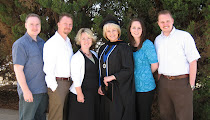I was doing some reading today and came upon this article about attachment and adult relationships. I found it very informative. I know raising toddlers is difficult and wears our patience. Remembering this information could help us with our patience, as we leave an impact on lives of growing adults.
Balancing dependence and independence: The human infant is the most helpless mammal on earth. We are totally dependent on our caregivers for survival. Our identity is "we not me". Between the ages of 2-3 years old we begin to test the waters of independence. The terrible two's is a stage when we begin to entertain the notion of a separate "me". Children need to assert a measure of control over their own lives in order to form their unique identity and establish their will. We hear the word "no" more as a two year old than any other time in life. With too many "no's" our independence can be stifled. Not enough "no's" leads to poor boundaries. This process of balancing dependence with independence continues throughout childhood and peaks during the heightened independence seeking and identity forming times of puberty and adolescence. Adolescents must disengage from parents in preparation for independent living.
Our relationship with our parents provides the solid foundation in which to discover our independence. Mature and loving parents create a safe environment in which children can freely express themselves. Stable families can handle the stress of "letting go" and can tolerate their child's autonomy. They encourage exploration of the environment, allow mistakes, and permit disagreement. Healthy family systems promote both connection and individuality, accountability and independence. Unhealthy family systems discourage individuality and promote dependence. They interpret individual differences as an attack on their authority. They undermine healthy development by reinforcing dependency and helplessness. Because of the parents' high levels of anxiety, stress, and need for control, individual expression is discouraged. Children are taught to conform to the parents' wishes and desires. Personal boundaries (where I stop and you start) are vague. These children are needy or "pseudo independent". They act independent on the surface, but are deeply dependent underneath.
The lessons we learn in our families growing up about dependence and independence are taken with us into our adult relationships. People who grew up with too much independence and not enough dependence have difficulty being present in relationships. Those who grew up with too much dependence and not enough independence tend to be overly needy or smothering. They place a lot of pressure on their partners to meet their needs. If both your partner and you are highly independent, then your relationships will be comfortably distant. If you both are dependent, then your relationship will probably be very co-dependent; obviously there will be problems with a highly dependent and a highly independent match.
Healthy couples know what they are bringing to the relationship and have an understanding of what they want to create. Each couple needs to work out its own unique balance of what works for them. How much time do we spend together, and how much time do we need alone. Without conscious awareness of our needs and expectations, the task of sorting out the balance of dependence-independence becomes a struggle strewn with conflict and hurt feelings.
http://www.attachmentexperts.com/adultcouple.html
Wednesday, September 22, 2010
Attachment
Posted by Kathy at 3:22 PM 0 comments
Subscribe to:
Comments (Atom)


